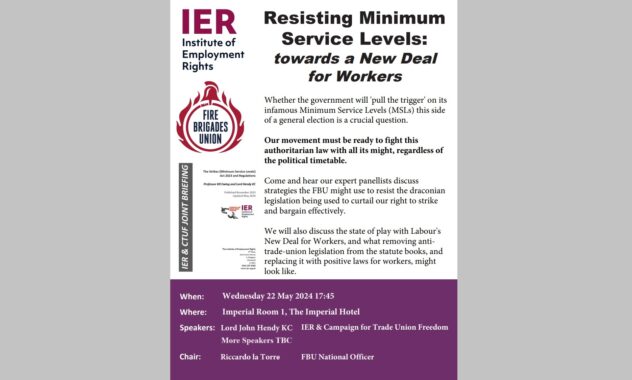MPs vote down Lord’s amendments to force through Government’s anti-strike legislation
Only one amendment taken on board by the Government

Late last night, MPs voted down some key amendments to the Strikes (Minimum Service Levels) Bill made in the Lord two weeks ago.
The amendements included changing the application of the bill from the UK to England only, excluding Scotland and Wales; ensuring a worker would not be dismissed for not complying with a work notice; introducing the requirement for a consultation to be carried out and reviewed before the Government could set minimum service levels; and ensuring there were no legal consequences for unions that induce workers who have been identified on a work notice to go on strike.
On each of these motions, the Government’s position to ‘disagree’ won by 50-60 votes. The one exception was an amendment to the effect that, when deciding whether to identify a person in a work notice, an employer cannot consider whether the person “has or has not” taken part in trade union activities, made use of their services or had a trade union raise issues on their behalf. That was accepted by the Government ahead of a vote.
Votes on the Lords amendments to the Strikes (Minimum Service Levels) Bill:
Lords amendment 1: Page 2, line 13, at end insert “but applies only to England”
Disagree (Ayes) 288 agree (Noes) 227
Lords amendment 2: Page 3, line 31, at end insert—
“(5) The powers conferred by this section must not be exercised unless a
consultation on the potential impact of their use has been carried out,
published, and reviewed by a committee of each House of Parliament
whose remit includes either the wider UK workforce and industrial
relations, or the sector to which the regulations in question relate.
(6) Such consultations must—
(a) be carried out by the Secretary of State and involve representatives
of any relevant unions, employers and other interested parties,
(b) include an assessment of the potential impact of the minimum
service regulations on the rights of workers to strike, the
effectiveness of the relevant services, and the impact on the wider
public,
(c) consider services in all categories listed in subsection (4), and
(d) include reference to respective service levels outside of strike
action.
(7) The results of the consultation and the reviews by committees must be
published in a report, and the Secretary of State must lay a copy of the
report before Parliament.”
Disagree (Ayes) 286 agree (Noes) 231
Lords amendment 3: Page 4, line 23, leave out from “to” to end of line 24 and insert—
“(a) whether the person is or is not a member of a trade union,
(b) whether the person has or has not—
(i) taken part in the activities of a trade union, or
(ii) made use of services made available to the person by a trade
union by virtue of the person’s membership of the union, or
2
(c) whether or not—
(i) a matter has been raised on the person’s behalf (with or
without the person’s consent), or
(ii) the person has consented to the raising of a matter on the
person’s behalf,
by a trade union of which the person is a member.
(6A) In subsection (6) “a trade union” includes—
(a) a particular trade union, and
(b) a particular branch or section of a particular trade union.
Accepted by Government
Lords amendment 4: Page 4, line 40, at end insert—
“234CA Protection of employees
(1) A person is not subject to a work notice if the person in question has not
received a copy of the work notice.
(2) It is for the employer to prove that an individual received a work notice.
(3) Failure to comply with a work notice is not to—
(a) be regarded as a breach of the contract of employment of any
person identified in the work notice, or
(b) constitute lawful grounds for dismissal or any other detriment.
(4) Having regard to subsection (3), failure to comply with a work notice is
deemed to be—
(a) a trade union activity undertaken at an appropriate time for the
purposes of sections 146 (detriment on grounds related to union
membership or activities) and 152 (dismissal of employee on
grounds related to union membership or activities), and
(b) participation in industrial action for the purposes of sections 238
(dismissals in connection with other industrial action) and 238A
(participation in official industrial action).”
Disagree (Ayes) 286 agree (Noes) 232
Lords Amendment 5: Page 5, leave out lines 9 to 22
Disagree (Ayes) 287 agree (Noes) 232
Lords Amendment 6: Page 6, leave out lines 19 and 20
Disagreed to
Lords Amendment 7: Page 7, line 28, leave out “, 234A and 234E” and insert “and 234A”
Disagreed to
Motion made, and Question put forthwith (Standing Order No. 83H(2)), That a Committee be appointed to draw up Reasons to be assigned to the Lords for disagreeing with their amendments 1, 2 and 4 to 7;
That Kevin Hollinrake, Mike Wood, Alexander Stafford, Jane Stevenson, Imran Hussain, Navendu Mishra and Alan Brown be members of the Committee;
That Kevin Hollinrake be the Chair of the Committee.
The reasons for the rejection of the amendments will now be communicated to the Lords, who may yet get a chance to table further amendments, ahead of Royal Assent for the Bill to become law.







